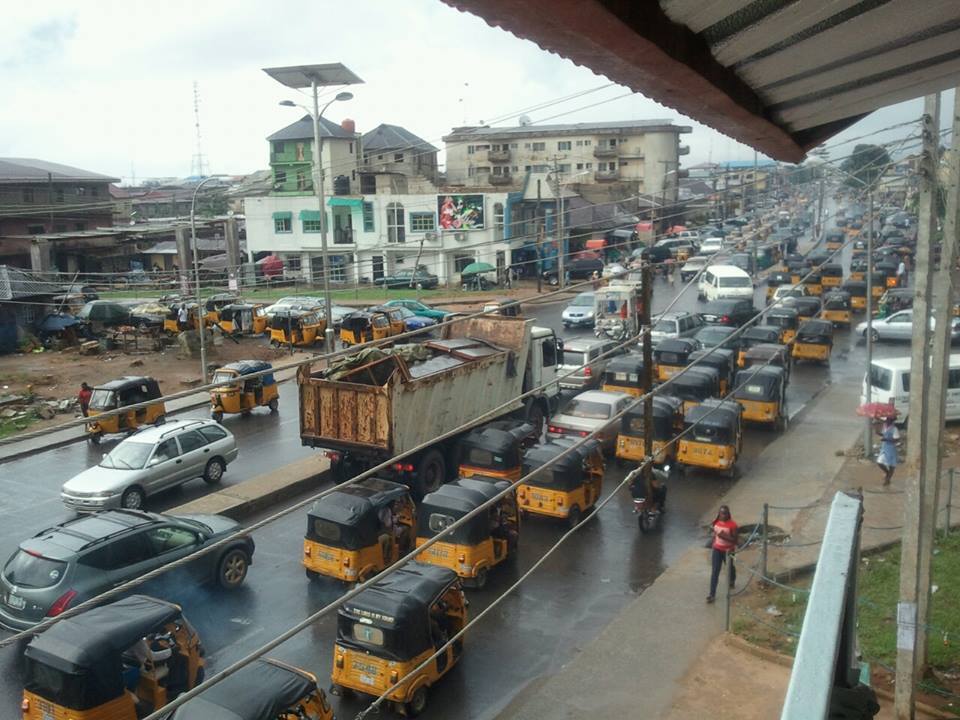Nigerian fintech startups made the biggest headlines in 2018 as they raised the most funding. Going on to 2019, there was a remarkable shift as mobility and logistics startups took over.
Draped in yellow and green, motorcycles belonging to these mobility startups sprung up in most of Nigeria’s major cities, spearheading the mobility and logistics sector’s charge of dominance.
With more funding pouring in, mobility startups sought aggressive expansion into cities with similar transportation challenges as Lagos.
Suggested Read: How mobility and logistics startups are overtaking fintechs as darlings of the Nigerian startup ecosystem.
The default status was to operate the popular on-demand model, where users download the app, sign up, and request rides. In some cases, however, users and riders can meet offline, then pair their apps to start a trip.
Things got interesting when these startups introduced tricycle-hailing services, popularly known as kekes, in order to expand.
To operate offline or online?
In August 2019, OPay announced the launch of its tricycle hailing-service, OTrike, in Aba and Kano.
Two weeks after OTrike’s launch, MAX.ng, founded by Chinedu Azodoh and Adetayo Bamiduro, launched MAXKeke, its own tricycle-hailing service to operate only in Lagos.
Barring any justification for establishing the keke verticals, there were doubts about how they would work as on-demand services.
Upon its launch, MAXKeke said it would “allow users to charter and enjoy privacy,” yet on the MAX app the option to charter a keke doesn’t exist. So how does one book a ride online?
MAXKeke, which was previously restricted to the Ikeja axis, now appears to service other areas. For instance, the Agric region of Ikorodu has since become a haven for dozens of the yellow branded tricycles.
Quite contrary to the original plan, the service works without the app and users board rides in a fashion similar to regular keke operators.
“We don’t use an app, we just carry our passengers like the normal keke. Since I became a rider here, I’m not sure anyone has used an app,” a MAX rider tells Techpoint.
OTrike has also had a major reversal with its app integration, even though information from OPay remains that users can charter a ride and make payments via the app.
Sources in Aba reveal that users could initially charter a keke via the app, but that over time the function was no longer used frequently.
“When OTrike launched here, it was easy to charter a ride. Now, anytime I try to book one, I don’t see any available. I have to go to their designated parks, else I can’t get a ride,” a source revealed.
What does this mean?
It’s a no-brainer that motorcycle-hailing services are better suited to work with mobile applications because motorcycles can cover greater distances and are adapted to defy traffic. The same can’t be said of kekes.
However, the fact that these tricycles remains a veritable vertical for these startups suggests there is more to the keke movement than meets the eye.
For MAX, finding a market to improve the bottom line and ensure returns on investor’s money is enough justification for the tricycle division.
Noteworthy is that the business is built off the hire purchase model, where according to a source, riders remit ₦4000 ($11) daily until the cost of the asset has been fully covered.
Perhaps, setting up an offline system where users can get rides effectively allows the business to scale quietly around Lagos. And with its recent $7 million investment, it seems a safer bet than connecting riders and users online.
In the case of OPay, since it emerged, it’s been trying to get more customers into its ecosystem and no doubt OTrike allows it to tap into a pool of fresh users through incentives like discounts.
OTrike users in news markets like Enugu say they can use the OPay app to request for kekes. The question, however, is will OTrike continue to offer online rides in these new locales or will it subsequently revert to offline rides like in Aba?










